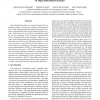Free Online Productivity Tools
i2Speak
i2Symbol
i2OCR
iTex2Img
iWeb2Print
iWeb2Shot
i2Type
iPdf2Split
iPdf2Merge
i2Bopomofo
i2Arabic
i2Style
i2Image
i2PDF
iLatex2Rtf
Sci2ools
134
click to vote
NCA
2007
IEEE
2007
IEEE
Decoupled Quorum-Based Byzantine-Resilient Coordination in Open Distributed Systems
Open distributed systems are typically composed by an unknown number of processes running in heterogeneous hosts. Their communication often requires tolerance to temporary disconnections and security against malicious actions. Tuple spaces are a well-known coordination model for this sort of systems. They can support communication that is decoupled both in time and space. There are currently several implementations of distributed fault-tolerant tuple spaces but they are not Byzantine-resilient, i.e., they do not provide a correct service if some replicas are attacked and start to misbehave. This paper presents an efficient implementation of LBTS, a linearizable Byzantine fault-tolerant tuple space. LBTS uses a novel Byzantine quorum systems replication technique in which most operations are implemented by quorum protocols while stronger operations are implemented by more expensive protocols based on consensus. LBTS is linearizable and wait-free, showing interesting performance gains ...
Byzantine Fault-tolerant Tuple | Fault-tolerant Tuple Space | NCA 2007 | Network Computing | Tuple Space |
| Added | 04 Jun 2010 |
| Updated | 04 Jun 2010 |
| Type | Conference |
| Year | 2007 |
| Where | NCA |
| Authors | Alysson Neves Bessani, Miguel Correia, Joni da Silva Fraga, Lau Cheuk Lung |
Comments (0)

